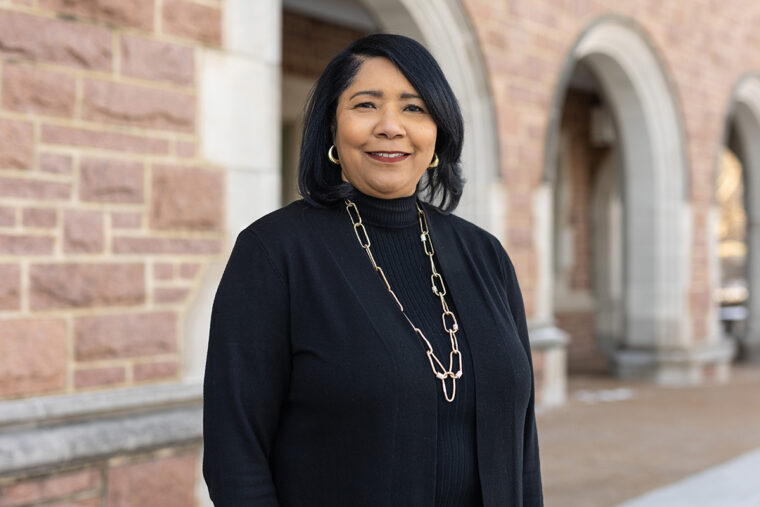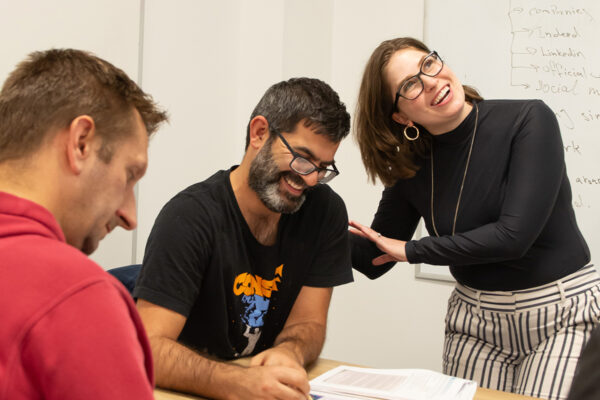As a finance major, Andrea Stewart-Douglas learned all about monetary policy, investment banking and accounting principles. And she still racked up credit card debt.
“I always tell students that even I have made mistakes managing money,” said Stewart-Douglas, the inaugural director of student financial wellness programs at Washington University in St. Louis. “You’re not born with this knowledge; you have to learn it.”
The financial wellness program is a new initiative from the Division of Student Affairs to improve financial literacy among all students. In her new role, Stewart-Douglas has developed classes and workshops on topics ranging from budgeting to taxes to investing. She also provides one-on-one coaching and connects students to financial resources and tools like iGrad, an online platform that helps students understand financial aid, credit reports and tax documents.
“Every student — no matter their background or their income level — needs to learn how to manage their money and plan for the future. We believe that by arming our students with the right information and the right skill sets, we set them up for greater success now and in the future,” Stewart-Douglas said. “Most of us learned these lessons the hard way, through trial and error. But we want our students to graduate from WashU knowing these important life skills.”
Stewart-Douglas said WashU is taking a holistic approach to financial wellness. Beyond financial education, Stewart-Douglas also supports students in need. She administers the Student Success Fund, which covers emergency and educational enrichment expenses. In addition, she connects students to financial aid, dining and housing resources.
Her office partners with the Taylor Family Center for Student Success, which supports the growing number of lower-income and first-generation students at WashU through peer mentorship and professional development programming. In total, 22% of WashU undergraduates are Pell grant-eligible.
“Financial literacy is only one part of what we do here,” Stewart-Douglas said. “It’s vital to address the gaps in knowledge. But we also strive to address the gaps in need. Our vision is to link the education piece to the resources so that we’re supporting the whole student in one place.”
But Stewart-Douglas stressed the every student stands to benefit from the initiative’s broad array of programs. At 5 p.m. March 25, students can learn how to evaluate an employer’s benefits package. And at 1 p.m. April 11, a wealth management expert will teach students how to start investing.
“We are always listening to our students to hear what topics are most relevant and timely to them,” Stewart-Douglas explained.
A national report by TIAA Institute’s Global Financial Literacy Excellence Center found that financial literacy, low across all generations, is particularly poor among Generation Z, today’s college students.
The report also found, unsurprisingly, a strong correlation between financial literacy — such as understanding how compound interest works and knowing how to file a 1098-T tax form — and financial wellness, such as having adequate resources to achieve financial priorities, meet unexpected expenses and plan for the future.
Stewart-Douglas observed this firsthand during her 12 years with WashU’s Student Financial Services. Although 26 states, including Missouri, require high school students to complete a course in personal finance, many students arrived in her office overwhelmed by their monthly bills. In response, she developed a program called B.E.A.R.S., which is short for Being Economically Aware and Responsible Students. Students learned how to make and keep a budget, establish credit and file their taxes.
Stewart-Douglas plans to develop even more educational opportunities for students across schools and classes such as the Bear Beginnings orientation program. Ultimately, she hopes to deploy a team of peer counselors and to create tailored programming for graduate and professional students.
Anna Gonzalez, vice chancellor for student affairs, said that financial literacy is a key component of the division’s “Healthy Excellence” initiative.
“We know that physical and mental health are foundational for lifelong success. And so is financial well-being,” Gonzalez said. “I can tell you, if you are stressed out about money, it can impact your grades; it can impact your mental health. Colleges have been slow to recognize the importance of financial literacy, but at WashU, we believe it’s part of our educational mission to help students build these important skills.”



